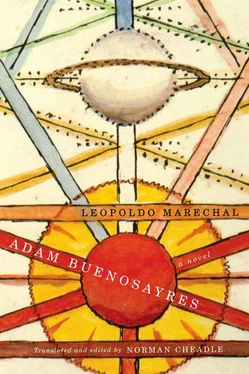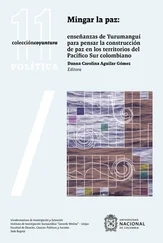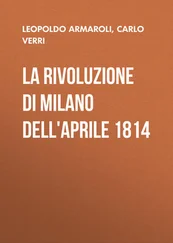— More than that! the mack thundered wrathfully. And how ’bout the two bars from “Don Esteban”? 93
— Fine, I conceded grudgingly. Then there’s that way you’d shuffle along the sunny side of the street, dragging your feet, all slow and stiff lest you bust some spring in your precious anatomy — oh, mack! — all the way down to the corner of Monte Egmont and Olaya, where you’d loiter for so long, you looked like a tree taking root, a sorry-looking tree, leafless and fruitless, every now and then deigning to flower in a meagre whistle.
— Whadda lotta malarkey! the mack interrupted me. Cut it out with the fancy jivin’.
— Or, I continued implacably, how about your grey nights in Don Nicola’s cantina (his famous one-hundred-percent plonk!), where you used to spend your idle hours (and such were all your hours) conniving with other loutish birds of a feather, or spinning lies about your martial feats, or boring them with false yarns about equally false amorous conquests.
— False? protested the mack in a clumsy boast.
I grabbed him by the kerchief and shook him a few times.
— But one thing’s for sure, I said. Arriving at the milonga, you’d hit the dance floor and your incommensurable inertia would vanish in a thousand cuts and figure-eights and zigzags of the tango. What Dionysian force possessed you then? What Panic wind, what Orphic dementia was it — oh, mack! — that could so shake you up and sublimate your ignoble clay, your indolent architecture?
— Lemme go! roared the mack, finding himself tugged by the kerchief.
— What gust of earthy…?
— Lemme go, ya pair o’ swells! You want trouble, come on over to Rancagua Park. I’ll take you both on with one hand tied behind my back!
Just then a blast of wind pulled us backward. Suddenly free, the mack let the same gust carry him off; quickly corkscrewing upward, he gained altitude and made the atmosphere ring with his threats, protests, and challenges. The astrologer and I got up off the ground, took hold of the forgotten rope, and set off walking again. The mack’s vociferations, however, must have roused the whole barrio, because the homoplumes , patently aggressive, started swooping down, coiling their prehensile tails around us, shouting confused diatribes into our ears.
— Place Pigalle, 94whispered a guitarist, coming face to face with the astrologer. You were a young guy who liked to play the intellectual, like the man says, who…
— Silence! Schultz enjoined him. What kind of history did you have, guitar-picker! From the Mercado de Abasto all the way to El Garrón cabaret in Paris! 95
— Now I’m playing on the radio, announced the guitarist, deeply sad. Place Pigalle in Paree!… Yeah, you used to talk egghead with those three bearded Germans. Chemists or alkeymists , I think they were called. Looking to make gold, or something like that…
— You patent oaf! cried Schultz, stung by those words. Didn’t you used to walk up and down the rue Fontaine, in dinner jacket and slippers, horking nasty spitballs over the lapdogs of retired whores?
— Dissolvons, putrifions, sublimons ! parodied the guitarist in execrable French.
The astrologer Schultz turned every colour in the rainbow:
— And what was your ridiculous ambition? he urgently asked the guitarist, as though wishing to change the subject.
— To lay a bouquet of camellias on the tomb of Marguerite Gauthier. 96
— Not that one! said Schultz. I mean the other one. The unmentionable one…
— I…
— Your supreme ambition, the astrologer mercilessly reminded him, was to have yourself photographed sitting in a luxurious vestibule on an armchair covered with a white throw.
The guitarist turned his eyes away and pretended not to hear:
— I’m playin’ for radio now, he mused at last in a voice thick with melancholy.
He prudently moved off, away from us, and Schultz’s face then expressed great relief, as if he had just warded off the risk of an awkward revelation. I looked at him, curious, and was wondering what veil over the astrologer’s secret life had narrowly escaped being drawn aside, when a homoplume came fluttering down and recited these words into my ear:
– “In their palatial mansions…”
I recognized the declamatory voice of Prince Charming. But the man was much changed since the last time we’d seen him at Ciro’s restaurant. His erstwhile filthy and dishevelled locks were now impeccably trimmed and well-nigh rhetorically coiffed. It was clear that facial massages and creams had worked wonders on his formerly pimply, sebaceous, pitted face. As always, he was wearing a high wing-collar (though now, marvellously, it was smudged by neither fingerprints nor flyspecks) and a honey-toned cravatte, in the centre of which gleamed a pearl, which may not may not have been oriental but came pretty darn close. In his loud-yellow — gloved hands, the sensitive malevo cradled and strummed a brass harp festooned in gaudy ribbons, whose dull strings of grocer’s twine thudded uselessly. I was glad to see him, for his presence in this circle of hell brought back fond memories of the world we’d imprudently left behind. I ventured to touch his long ostrich plume and said to him:
— Hail, poet! How go those demands for social justice?
Prince Charming recoiled from my hand, as if it were leprous.
— Have some respect! he deigned to warn me. Now I recite on the radio.
— I know! said I in a pitiful voice. That’s why the Muses of the Arrabal are in mourning.
Prince Charming gave me a disdainful smile, as if I were talking about Ancient History.
— Nowadays, he said, my fee is…
— Pesos? I laughed. Look who’s talking about money now! The man who once lashed bourgeois buttocks with the strings of his fulminating lyre; he who troubled the unjust sleep of magnates with naught but the clean blow of a stanza; he who…
— I wasn’t listened to! complained Prince Charming. No one’s a prophet in his own land. For all I care, the tyrants can thrive and multiply. Now I’ve got myself a seat at the banquet of life!
I looked at him with moist eyes:
— At the banquet of life! I exclaimed then. And for what? So sensible folks can laugh in your face, mocking your bad taste, so typically nouveau-riche, and your thuggish elegance and luxury. Those over-the-top shirts, those declamatory ties, those suits of impossible architecture, those agressive shoes you now show off at broadcasting sessions — a scourge for the eyes, an outrage against the light. And what to say about your neuralgia-coloured automobile and its calfskin upholstery? Or your apartment stuffed with useless furniture and knick-knacks, congested with mirrors, where a person can’t even turn around?
— Jealousy will get you nowhere! said Prince Charming sententiously.
— No, Prince, no! I said affectionately. Ever since you left, the soul has gone out of Ciro’s. The barrio moans, the old women whisper, and everyone says in one voice…
— What can they say? crowed the Prince.
— That some day your luck will turn. Once from the Maldonado, always from the Maldonado.
Prince Charming squirmed, tried out a disdainful chortle, cast about for a counter-argument. But he was cut off by three buzzing homoplumes who dove down on us in formation.
— Five times eight is forty! said the three voices in chorus. The pampa has the ombú!
— When? I asked them, recognizing without much enthusiasm the three members of The Bohemians.
— From 6 to 6:15 p.m. LX3, Radio Threnody.
They flew off as swiftly as they had come. And then at my back I heard the melancholy strains of a vihuela. I turned on my heels and faced a homoplume in a gaucho’s hat and chinstrap, whom I recognized as the payador Tissone. Full of a certain bovine melancholy, he contemplated me for a moment. Then, plucking at his guitar, he declared:
Читать дальше












